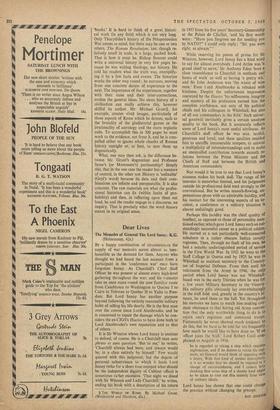Whether Mr. Connell is right in feeling so indignant is
another matter. Lord Russell and Mr. Scott feel the Government to be morally as well as politically and strategically wrong and the danger of its courses to be desperate. SOrely, whether they are good judges or not, it is their moral duty to protest in any way they can think of, and as quickly and effectively as they can? Isn't this what Mr. Connell, and many who feel like him, say that 'the good Germans' ought to have been doing under Hitler?
*
It is a long time since I referred in these notes tc the nineteenth-century peer, mentioned by Lord Winterton in a House of Lords debate, whose endearing eccentricity it was that he be- lieved himself to be pregnant, and who used to say that 'the whole world awaits this unique event with interest: her ladyship is taking it very well.' My excuse for referring- to. him again, after a lapse of weeks, is that it is only now that I have been given his name, which Lord Winterton had been unable to recall. Readers must' forgive the delay, which is due to my I 960 correspondents being so far-flung. 1"rottin$ steadily through the bush from Shiwa Ngancin' in Northern Rhodesia, a loin-clothed postman has brought me, in a cleft stick, the int oi mation from Sir Stewart Gore-Browne that the pregnant peer was a Lord Dudley of Victorian times. wh° never travelled from home without a complete accouchement apparatus, as he expected the happy event at ariy moment. The news from Ngandu includeS an irm portant footnote to this fragment of social history: it seems that when Lord Dudley CO suited the family solicitor as to who would be his heir, should his offspring he a boy—the child of his own body, or Lady Dudley's—the lawyer replied, 'Her ladyship's, a priori. Your own child' my Lord, could only be a posteriori.
Those who have pondered in their time °ver the difference between the merely naughty and the outright wicked, or speculated as to when licentiousness becomes unbridled, will have been enlightened by the News of the World's story of the 'blonde eighteen-year-old shorthand-tYPiP froth Scunthorpe, 'who said she had not only posed unclothed for Armstrong since late l959' but she had typed his letters for him Just before he died, in April, Philip WI° Shand revised his splendid A Book of Fref1ht Wines, first published in 1928. No amateur °` wine should be without the new edition (Car' 30s.), for it contains all the statutes that govern the French laws of appellation (would that their writ ran here!), as well as an amusing' instructive and opinionated chapter on changes in taste since the first edition of the book. Much indeed has changed and much is chang ng• e. cause of the shifting economic structure of tile wine-growing industry and the win' e..seningd trade, and because of changing social habits an, distribution of wealth. One of Shand's late!' comments, for instance, is already being prove ' out-of-date. He had written that 'as the Pill' duction of Gaillac is quite considerable it seethe curious that none has yet appeared on A English market.' A couple of days after I re3' these words, I learned from the enterpris n5 ewe of Smith and Hoey that they are importing Gaillac wines—a dry and a sweet white. a PiniC and a red, all bottled here and 'sold at 05. a bottle (I liked the whites, but thought less of the pink and the red), and a Gaillac /41 de hlancs perld, bottled in France, to be Nu° ti
for I3s. 6d. at Abells, of 568 London Road. worth, and the Osterley Wine Stores, 154 Taal bury Road, Osterley.
We tried this last one the other eveningwith a stuffed bream. Bream is underrated in BritalZ and I hope the same will not continue to said of Gaillac wines. The None de °WI° wits delicate in flavour, as wines are that af, made only of white grapes, but quite tive, less flowery than a hock, drier than a a 01
'
Bordeaux, yet different again from tongnei;
burgundy, and a little prickly on the
which is what I imagine perle means. 1 thin/ fairly fondly of Mr. Heathcoat Amory villcri I.1 recall that were it not for his last Budge,' ;fi would have cost me—having been imported bottle—a couple of shillings .more. c'










































 Previous page
Previous page